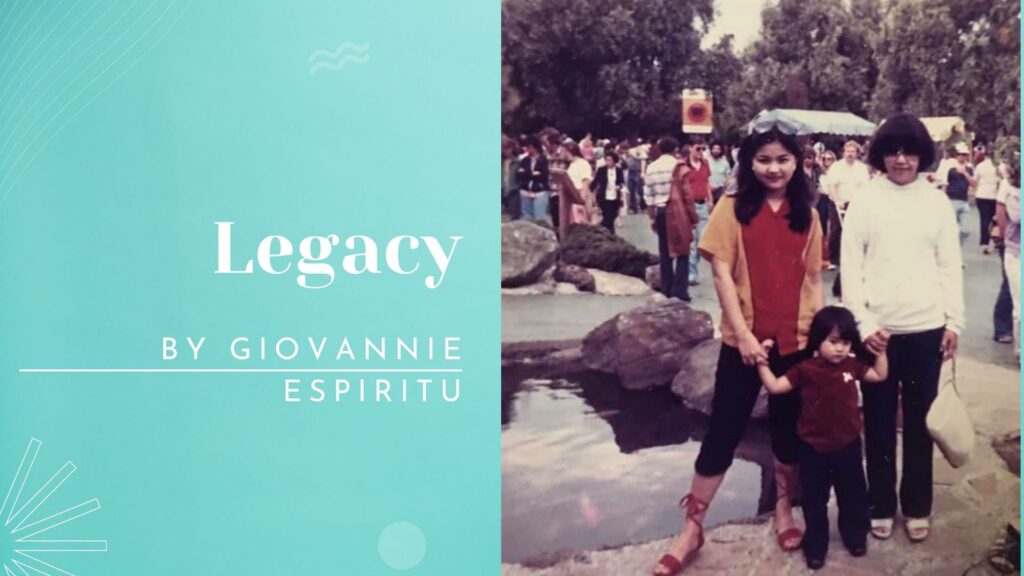
On hearing my friend and PGA (Producers Guild of America) colleague Giovannie Espiritu winning a Telly Award for her documentary short “Legacy,” I took the opportunity to interview her about her career as a multi-hyphenate in Hollywood, working as a production coordinator for a production company, an actress and a producer of independent films on her own.

First, congrats on the Telly Awards win for “Legacy”! Tell us how did “Legacy” come about and why did you decide to make a documentary short film?
GE: Thank you! I actually wrote it for the Outfest Fusion filmmaking contest in 2022. I was at Outfest supporting my friend Florencia’s film, and I remember thinking how much I love my friends even though I only see them every so often and how important chosen family is. I woke up with a poem in my head on the last day of the submissions. I recorded it, added some pictures and turned it in before the deadline, and didn’t think about it. Then I got an email saying that I won the Hyundai Evolve Innovation Award. Since then, it’s been part of several museum exhibits and film festivals, including the New Americans Museum and OutMuseum.
It seems you’re always so busy. You’re a production coordinator at a company, you act full time and you also produce and direct your own films. How do you juggle between working for a production company, acting full-time while producing your own films? Is there one thing you gravitate towards more?
GE: The busy-ness is mainly for survival reasons in the life of a single parent/gig-worker. I work hard, and am not afraid of doing grunt work because I learn from every single production that I am part of. As an actor, you are kind of at the mercy of what stories are being told. As an employee or contractor for various production companies, you still are beholden to the culture of the company that you work for. I’m starting to gravitate more towards producing and creating the stories that I want to see in the world… but I still have a lot to learn.
You’ve been consistently directing a lot of short films, so tell us about “Ally 3000” that you made. What was the challenge and result in making that film?
GE: A lot of my shorts start from a place of anger and are a catharsis for what is happening in my life at that time. The inciting incident for this particular short was being passed up for a job that I was extremely qualified for by a mediocre candidate who happened to be a white male… and my brain started to wonder what it would be like to have the privilege of a dude. So in my frustration I wrote Ally 3000 – it’s a comedic satire about a CEO that is presented with a product designed to alleviate white guilt. It won about 12 awards on the film festival circuit, mainly in the categories of screenwriting and social justice. Eventually it was acquired by TBA studios. I made it for under $800, so the production value isn’t all that great, but I try to do what I can with what I have. The challenge in filmmaking for me has always been about raising funds.
Tell us about your acting career? Did you start acting first and then get into filmmaking?
GE: Aahahahahahahha, I got into the acting world in a weird way. I was living in a cabin in the mountains next to the national forest and the only people I would talk to from the outside world were telemarketers. I would try to keep them on the phone for as long as I could because I didn’t have any friends. One of them said that I had a really interesting voice and said I should get into voice overs. My “husband” at the time had recently quit his job because Jesus was coming back soon, and he needed to prepare. We had a one year old… so I was kind of desperate. I looked up voice overs on the nascent internet and applied to the one that had the biggest ad which was Stars the Agency in SF. Then ended up calling me in, signing me on the spot, sending me on my first VO audition the same day and I ended up booking it. It was more money per hour than I had ever made, so we took it as a sign from God. (Note: I don’t consider myself a Christian anymore, but I do believe in some kind of animating intelligence to the Universe.)
As far as filmmaking goes, I started out little by little, helping out behind the scenes on various projects. My own filmmaking started more recently after being frustrated with the lack of representation for women of color.
I also know you were undocumented and that you were kidnapped by a religious cult. Can you talk about that and how that experience has affected you as an artist?
GE: My parents came here “TNT” – which is Tagalog slang for “Tago-ng-Tago.” It means “Hide and hide.” I was only 2, so I didn’t know anything about my undocumented status. Bits and pieces would come out as I grew up…like, I thought my name was Anne until the fourth grade. Evidently my mom needed papers for me to enroll in school so she had me baptised at St. Anne’s (we weren’t even Catholic), so that’s how I got that name. When my dad applied for naturalization, that’s when I found out my actual name was Giovannie… which I think is even more hilarious, because it’s such an Italian name, and I think my mom, who was a teenager when she had me, was trying to put her aspirations of being European (300 years of colonization will do that…) on me.
I wasn’t kidnapped by a cult. I made the choice to join as a teenager. It’s a long story… but in the beginning of my sophomore year, my mom moved us back to the Philippines and I found out she had another family. I was in a state of shock to say the least, and was in desperate need for stability and order. So I joined a youth group in the mainstream SDA church. It never starts out as a cult… it starts out as a group of people that want to do good in the world. At least that’s why I gravitated towards it… they were a bunch of teenagers that sang really well that were trying to do good in the world. From there it got kooky and more radical with Biblical prophecies, end of the world predictions, and learning wilderness skills to prepare for the impending apocalypse. I ended up working in Yosemite for a couple who had a home church and being married off-the-record as an underage bride. There were people in the movement that didn’t even have social security cards because they didn’t want the government to have their information.
Most of the work that I write tends to have themes of generational trauma and healing, questioning of authority, and some kind of rage against the patriarchy. Art is cathartic for me in that way.
What are you doing with that religious cult experience as an artist?
GE: I just finished principal photography on a movie called, “Love & Karma,” which is inspired by a true romance of a Filipino couple – an ultra conservative Bible traditionalist, and a worldly Filipina American woman. I got to tap into my ex-fundamentalist Christian brain as well as my hedonistic alter ego while writing that.
I’m currently raising funds to make “Legacy,” into a longer documentary… but I want to add some comedic sketches so it’s not all trauma porn.
I’m open to doing some kind of narrative series at some point, but I’d rather not write that myself. I don’t want to stay in that mental/emotional space too long.
Can you talk about how your bisexual / LGBTQ+ perspective influenced you as an artist?
GE: For a long time, I didn’t even have the words to understand myself. I knew I was different when I was young. People told me that my “tendencies” growing up were something to be ashamed of… even dressing slightly more masc at church, I was called an “abomination.” Then when I joined the cult, I stuffed down that part of my identity down the furthest, for fear of being seen as “evil.” So I think I’m drawn to stories where the seemingly good people carry a dark secret and those labeled as monsters are the ones that are doing the “good” things.
But I think that being queer is so beautiful. My friends are some of the most courageous people that I know. We embody love in its highest form: whatever meat sack (body) we happen to be in doesn’t matter… it’s all about the soul inside the meat sack. To me, being queer is about infinite possibility and I think that sometimes it scares people.
All the characters I have played have been bi, simply because I am. LOL. And most of my writing has some kind of nod to being non-binary.
GE: What is one advice you’d give to someone younger like you who wants to become an artist and filmmaker?
Just start, however small. My first film that got an honorable mention at Outfest was literally just me and a laptop. Then take the next best step afterwards… even if it is a baby step. It’s so cheesy, but I really believe that we don’t have to see the entire journey… the next step on the path is enough.

